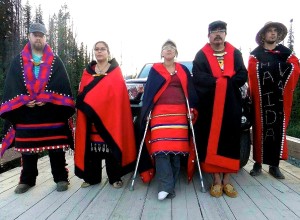Attached to this blog post is an excerpt from a video with Toghestiy and Freda Huson from my first visit to Unist’ot’en Camp in 2014. It is of Toghestiy talking about the importance of going through ‘protocol’ when entering a First Nations traditional territory.
Friends and I were visiting the camp last year to help with the building of a bunk house that would allow community to live their year round to keep an eye on the land and prevent oil and gas industry workers from violating Wet’suet’en sovereignty. There were several dozen people who came there to help work on the structure, as well as a traditional pithouse and permaculture garden, all put directly in the path of proposed pipelines.
Before being allowed entry to the territory, we were required to go through protocol procedures where we were asked who we were, what our intentions were, and to justify why the Unist’ot’en should allow us entry into their traditional territory. It was at first simultaneously unnerving, confusing, and unexpectedly empowering. I felt strangely emotional afterward and it took me a bit to sort it out. In doing protocol, we were asked to publically acknowledge that we respected and supported the Unist’ot’en in what they were doing and what their ancestors had felt the responsibility to do for thousands of years. For the Unist’ot’en, it being ‘their land’ was, from what I came to understand, less about them ‘owning the land’ as their having an obligation to the land and belonging to the land. Doing protocol was also asking us to name publically that we felt like we were acting in a positive way in the world and to give a sense that we knew concretely how we were doing that and for what reasons. It was asking us to take a stand and step into our power.
In North America, there is this deeply embedded feeling that it is OK for us to go anywhere in ‘public lands’ and ‘wilderness areas’. The whole idea of wilderness areas in north America is a racist erasure of the memory that these lands are the territories of specific people and that these people have been the guardians and protectors of these lands for, in many cases, thousands of years. The idea that these nature areas that we turn into park or industrial forest land are somehow ‘public access’ is part of the deliberate attempt to not just forget the past, but make invisible the present continuous existence of these people. Being in solidarity with Wet’suet’en, Tsimshian, Gitksan, Haisla, Haida, Tahltan, Helitsuk and other First Nations means first deliberately and publicly remembering the past and acknowledging that there is not a discontinuity with the present. Colonialism is not something of the past, but something that is reenacted continuously, both against and within First Nations communities. We have had victories against this disease of the social mind, colonialism, but it exists deeply in all of us. Remembering and practicing protocol is a powerful tool on many levels for confronting colonialism as it still exists inside of us. By doing proper protocol when entering a nation’s territory, we practice a small important piece of individual and community healing for all of us and the land.
Freda and Toghestiy were gracious enough to spend a little time with me for an interview, the first interview I did in my trips up north. Clips from this interview and others from Unist’ot’en Camp can be found in the work-in progress video on the home page for this project. I wanted to share this particular response from Toghestiy about protocol in its entirety, as i found it very moving to hear.
Doing Protocol is a core tradition of First Nations communities in the Northwest, part of the continual enactment of relations amongst nations and the continuous re-acknowledging of land stewardship and obligations to the land. There is a parallel to what we all go through whenever we cross an international boundary, but there is something here more direct, intimate and personal.
It has been part of the Canadian (and US) assault on aboriginal culture and denial of history and sovereignty to suppress these ceremonies. They survived through the brave and dedicated efforts of elders who risked imprisonment and many other forms of violence in order to keep their practice alive. I have been moved on many occasions to watch protocol, especially as I understand it more, understand not just what it symbolizes, but what it actually does to participants. It is an important act of solidarity and of entering into respectful relationship to go through these ceremonies when visiting a nation’s territories. It is an act of mutual support in maintaining right relationship to the land.
Toghestiy explains…
PS. here is a link to the Unist’ot’en Camp page on Free Prior and Informed Consent and Protocol
